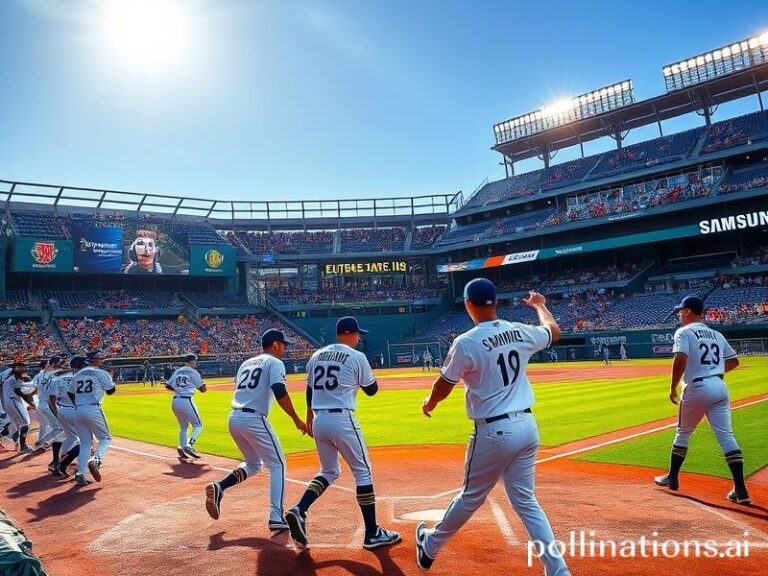Mazatlán vs. Pumas: When a Beach Resort and a Broke University Play Out the World’s Existential Crisis on a Football Pitch
Mazatlán vs. Pumas: A Carnival of Collapse Played Out on Two Continents
By Dave’s Locker International Desk
The Pacific tide rolls in over Mazatlán’s malecón just as the tide of public patience rolls out for Club Mazatlán and their perennial tormentors, Pumas UNAM. On paper it’s merely another mid-table Liga MX fixture, a Wednesday-night obligation wedged between taco stands and Netflix autoplay. Yet from a safe distance—say, a Berlin kneipe where the match streams at 3 a.m.—the whole spectacle looks like an allegory for a planet that can’t decide whether to laugh or file for bankruptcy.
Mazatlán, the resort city invented by PR firms and cement trucks, is still trying to convince the world it’s more than a timeshare with a lighthouse. Pumas, meanwhile, arrive from Mexico City carrying the intellectual pretensions of a public university team that once read Sartre and now reads balance sheets. One club is desperate to matter; the other is desperate to remember how it once did. Sound familiar? Swap “club” for “nation-state” and you’ve got the G-20.
Globally, the match is a case study in leveraged optimism. Mazatlán’s owners—consortium of shrimp magnates, ex-governors, and that one cousin who owns a crypto yacht—bought a franchise the way bored oligarchs buy English newspapers: as a branding exercise, not a sport. Pumas, nominally the people’s team, are so deep in debt their accountants have started speaking in haikus. Still, FIFA rankings and sovereign credit ratings share the same delusion: if you ignore the interest long enough, it disappears.
The worldwide implications? Consider the betting markets. From Manila to Lagos, micro-wagering apps have turned this regional squabble into a financial derivative. Somewhere in Vilnius, a teenager just mortgaged his gaming rig on the over/under of Mazatlán red cards. The kid has never seen the Pacific, but he knows Pumas’ left-back has the turning radius of a container ship. Capitalism, unlike football, never sleeps.
Then there’s the geopolitical spice. Mazatlán’s jerseys are manufactured in Bangladesh, stitched by workers who, ironically, can’t afford the streaming subscription to watch their handiwork unravel in real time. Pumas’ flight north burns enough jet fuel to drown a coral reef, which is convenient because Mazatlán’s beaches are already busy rehearsing for their next sewage cameo. Climate negotiators in Dubai could save themselves the slide deck and just project this match on a jumbotron; the metaphors write themselves.
Back in the stands, the human comedy continues. Mazatlán’s ultras—bored hotel staff on their day off—wave plastic swords meant to evoke pirates. Historians note the original pirates were more honest: they stole directly and didn’t issue corporate statements about “community engagement.” Pumas’ traveling contingent, a caravan of philosophy majors and disappointed poets, chant about “dignity,” a currency currently trading below dogecoin.
The game itself? Ninety-three minutes of choreography pretending to be spontaneity, punctuated by a VAR decision so drawn-out it could qualify for Mexican citizenship. Final score: 1-1, the diplomatic result nobody wanted but everyone expected—much like COP28.
And yet, the broader significance is hard to ignore. In an era when nations weaponize nostalgia and billionaires weaponize boredom, Mazatlán vs. Pumas is global politics squeezed into polyester. Every misplaced pass is a broken promise; every theatrical dive, a sovereign default. The referee’s whistle is the last honest sound on Earth, and even that’s sponsored by a sportsbook.
As the floodlights dim, fans shuffle back to all-inclusive resorts or overnight buses, clutching the same souvenir: the realization that hope, like tequila, is more effective the less you examine its origins. Somewhere above, a satellite beams the highlights to investors in London who still think “football” means Manchester United. They won’t notice Mazatlán’s tears or Pumas’ student-section existentialism. But the planet keeps spinning—on its axis, on its debts, on its delusions—until the next whistle blows and we all agree, once more, to pretend the score matters.







